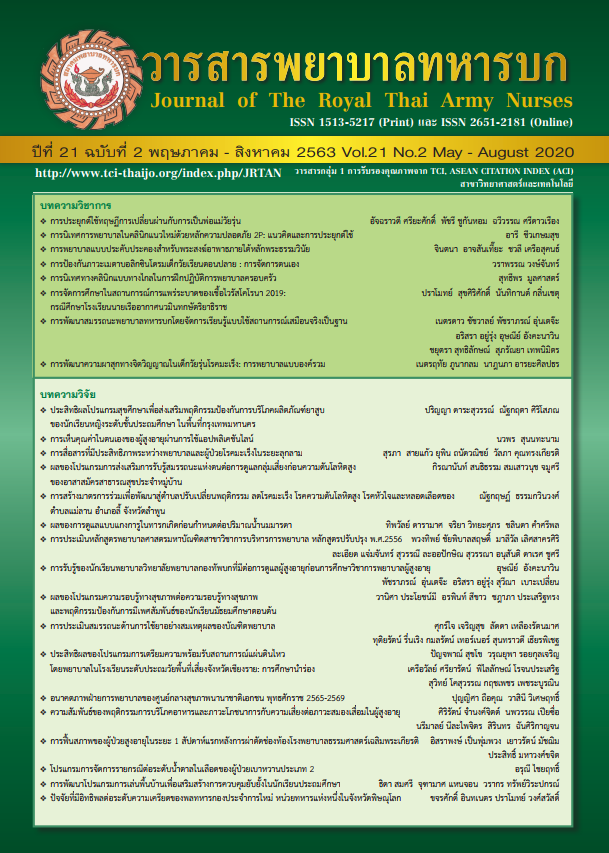A Development of Inhibitory Control Based on Thai Traditional Game Training Program in Elementary School Students
Keywords:
Inhibitory control, Thai traditional game, Executive functionsAbstract
The purposes of this study were to study the effects of a developethe Inhibitory control based on Thai traditional game training program in elementary school students and to test the effectiveness.The sample was 60 students of Watnuenpra School, Rayong in the 2018 academic year. The sample was randomized by using sample random sampling into 2 groups. Experimental groups and control groups. Each group consisted of 30 students. The research instruments were 1) The Inhibitory control base on Thai traditional game training program in elementary school students and 2) Go/No Go Task. The experimental group received the program 2 times per week and the control group received the regular instruction from the school in the same period. The assessments were done in 3 phases: pretest, posttest and follow-up phase. The data were statistically analyzed by utilizing a repeated measures analysis of variance and paired-different test by Bonferroni method.
The results revealed that the interaction between the experimental methodology and the duration of the experiment were found statistically significant at .05 level. Students in the experimental group had the mean score of inhibitory control higher thanthose in the control group in the posttest and follow-up with statistically significant at .05 level. Students in the experimental group had the mean score of inhibitory control in the posttest and follow-up higher than the pretest with statistically significant at .05 level. It was concluded that the inhibitory control based on Thai traditional game training program in elementary school students had the effectiveness on enhancing inhibitory control in elementary school students.
Downloads
References
Diamond A, Lee K. Interventions shown to aid executive function development in children 4 to 12 years old. Science. 2011;333(6045): 959-64.
Chutabhakdikul, N., Thanasetkorn, P., & Lertawasdatrakul, O. Tool Development and Evaluation Criteria for Assessment of Executive Function in Early Childhood. Bangkok: The Institute of Molecular Biosciences; 2017. (in Thai)
Penela EC, Walker OL, Degnan KA, Fox NA, Henderson HA. Early behavioral inhibition and emotion regulation: Pathways toward social competence in middle childhood. Child development. 2015;86(4):1227-40.
Casey B, Tottenham N, Liston C, Durston S. Imaging the developing brain: what have we learned about cognitive development? Trends in cognitive sciences. 2005;9(3):104-10.
Bunge SA, Hazeltine E, Scanlon MD, Rosen AC, Gabrieli J. Dissociable contributions of prefrontal and parietal cortices to response selection. Neuroimage. 2002;17(3):1562-71.
Caine RN, Caine G, McClintic C, Klimek KJ. 12 Brain/ mind learning principles in action: Developing executive function brain of human. 2ed: CA: Corwin Press; 2009.
Haenjohn, J., Sirithadakunlaphat, S., & Supwirapakorn, W. Development of training on promoting executive functions of the brain in adolescent, Journal of The Royal Thai Army Nurses 2018;19(2):220-30. (in Thai)
Qian Liu, Xinyi Zhu, Albert Ziegler, Jiannong Shi. The effects of inhibitory control training for preschoolers on reasoning ability and neural activity. Scientific Reports. 2015:1-10.
Pullarp, R., Thayansin, S. Intelligence and academic achievement of adolescents with game addiction. Kasalongkham Research Journal 2012;2. (in Thai)
Gentile DA, Choo H, Liau A, Sim T, Li D, Fung D, et al. Pathological video game use among youths: a two-year longitudinal study. Pediatrics. 2011:peds. 2010-1353.
Boonitsarasaree, T., Sriharun, B., & Kongthong, U. The effects of folk play activity package on learning achievement of physical education for grade 3 students in the demonstration school of Rajabhat University. Valaya Alongkorn Review, 2015;5(2):101-12. (in Thai)
Duangsrikaew, B., Chamnankit, B. The effect of using the Thai children’s traditional game activities experience on the social behavior of preschool children. National and International Conference Interdisciplinary Research for Local Development Sustainability; Northern Rajabhat universities. 2015. p.679-90. (in Thai)
Sripukdee, C. The study of preschool children’s self-discipline through thai game experience [Master’s thesis]. Bangkok: Srinakharinwirot University; 2012. (in Thai)
Enkavi AZ, Eisenberg IW, Bissett PG, Mazza GL, MacKinnon DP, Marsch LA, et al. Large-scale analysis of test–retest reliabilities of self-regulation measures. Proceedings of the National Academy of Sciences. 2019;116(12): 5472-7.
Kaiyawan, Y. The principle research and thesis. Bangkok: Bangkok Supplementary Media Center; 2007. (in Thai) 16. Howell DC. Statistical methods for psychology: Cengage Learning; 2012.
Gomaratut, C. Thai traditional sport. Bangkok: Sathaporn Books; 2006. (in Thai)
Pahirun, P. The effects of brain, mind and learning training program on executive functions (EFs) of the brain in primary school students [Master of Science]. Chonburi: Burapha University; 2018. (in Thai)
Netrnilweerachot, D.The Effects of Storytelling based on the Royal Guidance of King Rama XI Program on Executive Functions of the Brain in Early Childhood [Master of Science]. Chonburi: Burapha University; 2018. (in Thai)
Kumlerd, S., Haenjohn, J., & Supwirapakorn, W. Development of problem solving training program based on acceptance and commitment therapy in adolescents and young adults with amphetamine addiction. Journal of The Royal Thai Army Nurses 2019; 20(1):181-87. (in Thai)
Panyencheun, W., Haenjohn, J., & Sirithadakunlaphat, S. Development of Program to Promote Attention Based on Neuro-Linguistic Programming in Primary School Students. Journal of The Royal Thai Army Nurses 2019;20(3):305-12. (in Thai)
Hillman CH, Erickson KI, Kramer AF. Be smart, exercise your heart: exercise effects on brain and cognition. Nature reviews neuroscience. 2008;9(1):58.
Downloads
Published
How to Cite
Issue
Section
License
บทความหรือข้อคิดเห็นใดใดที่ปรากฏในวารสารพยาบาลทหารบกเป็นวรรณกรรมของผู้เขียน ซึ่งบรรณาธิการหรือสมาคมพยาบาลทหารบก ไม่จำเป็นต้องเห็นด้วย
บทความที่ได้รับการตีพิมพ์เป็นลิขสิทธิ์ของวารสารพยาบาลทหารบก
The ideas and opinions expressed in the Journal of The Royal Thai Army Nurses are those of the authors and not necessarily those
of the editor or Royal Thai Army Nurses Association.






